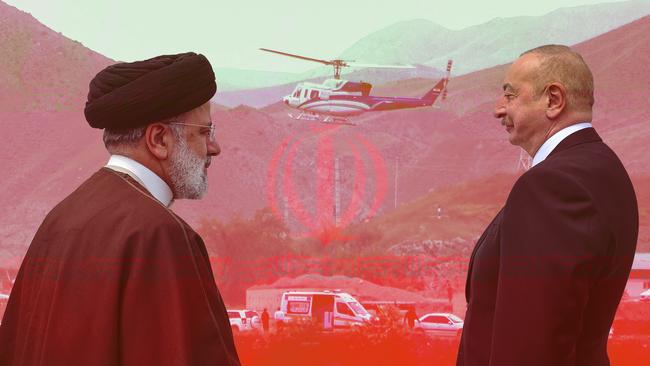
Although the crash initially appears to have been caused by bad weather, this won’t stop rumours abounding about possible involvement by Israel or Western intelligence. If any evidence were to emerge of foul play, Raisi’s death would instantly become a flashpoint for potential regional conflict.
Raisi, who was the probable successor to Supreme Leader Ayatollah Khamenei, will not be missed by the West.
He was a hardline cleric virulently anti-Western and anti-Israel, an eager sponsor of global terrorism groups such as Hamas and Hezbollah, a supporter of Iran’s nuclear weapon ambitions, a represser of social freedoms, especially women’s rights, and a warm friend of Vladimir Putin and Xi Jinping.
His death will usher in a power struggle at the top of Iran’s ruling elite, which has the potential to destabilise the country’s religious leadership at a time when it is increasingly unpopular among ordinary Iranians.

But we shouldn’t expect that his demise will lead to major changes in Iran’s policy direction, both at home and abroad.
Iran’s political system is structured to reinforce the power of the country’s conservative Islamic theocracy, which has ruled since the overthrow of the shah in 1979.
Although Raisi had been president since 2021 and was a significant figure in Iran for decades, there are many other hardline conservatives in the Iranian system who could take his place.
As president, the 63-year-old was the second most powerful person in Iran behind Khamenei, and his job was to carry out the leader’s edicts on religious, military and political policy. So, although Raisi carried out the day-to-day running of Iran, it is the highly conservative Khamenei, who was selected by a council of clerics rather than by the public, who sets the country’s policy direction.
With Raisi’s death, a special election for a new president will be held, and although this is a publicly elected position, Iran’s presidential elections are rigged and it is unlikely that a liberal reformist will suddenly emerge to replace him.
Even so, the loss of Raisi and also his foreign minister on the same helicopter, is a destabilising blow for the regime at a time when Tehran is playing a high-stakes game in confronting Israel and the US in the region since Hamas’s attacks on Israelis on October 7.
Under Raisi’s watch, Iran moved to confront its longtime enemy Israel like never before. In April Iran launched its first direct attack on Israel, firing hundreds of ballistic missiles, drones and cruise missiles at the country after an Israeli attack on Iranian forces in Syria.
Although the attack was unsuccessful and largely aimed at domestic consumption in Iran, it showed a new level of determination by Iran in confronting its long-term foe.
The most important question is whether Raisi’s death will lead to different judgments in Iran’s finely balanced policy of using its terror proxies in the region to provoke Israel short of triggering a major conflict.
Since the Israel-Hamas war began last October, Iran has authorised regular but low-level attacks on northern Israel by Hezbollah forces in southern Lebanon. But whenever these attacks threatened to escalate, Hezbollah has stepped back.
Similarly, Iran encouraged its terror proxies in Syria and Iraq to launch irregular attacks on US troops based in those countries, but when the US responded with strikes, those proxies pulled back. Will that deliberate balance be maintained without Raisi at the helm or will his death usher in a dangerous uncertainty about the behaviour of Iran’s proxies?
Domestically, many Iranians, especially younger ones, will welcome Raisi’s death. He was widely unpopular among ordinary Iranians for his role in overseeing crackdowns on anti-government protesters in late 2022 that led to the deaths of more than 500 people and which were triggered by so-called “morality police” enforcing harsh restrictions on women’s dress.
Raisi was also unpopular with many older Iranians because of his role in ordering the executions of political prisoners in 1988 at the end of the Iran-Iraq War.
The defining split within Iranian society today is the growing tension between ordinary Iranians who want greater freedoms and a more Western lifestyle and the ageing Islamic regime of hardline mullahs.
Raisi’s death will not fundamentally change this, but the loss of his voice is one less obstacle for those brave Iranians who are pushing for a brighter future.







Iranian President Ebrahim Raisi’s death in a helicopter crash is a gut-punch to the Islamic regime, triggering instability within its ruling elite at a perilous moment in the country’s history.